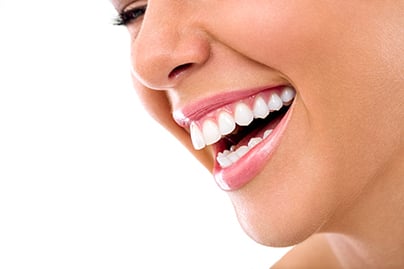Dental health is a key component to the prevention of chronic diseases. Oral bacterial endotoxins and ensuing inflammation have been associated with the development of many diseases. Oral care is a key component when striving for optimal health.

Periodontal disease refers to gum disease and includes both periodontitis (which affects underlying bone) and gingivitis (which does not affect bone). Gingivitis is the most common form and is characterized by redness, swelling, and bleeding of the gums. Plaque, or the accumulation of bacteria, forms within 24 hours without proper brushing and flossing. When plaque becomes mineralized, it is known as tartar and requires removal by a professional. Tartar build-up can lead to gum recession which can result in tooth loss. Dental caries or cavities involve the destruction of tooth’s enamel by bacteria.
Risk factors for poor dental health in children include the frequent consumption of sugary snacks and beverages, prolonged use of a sippy cup during the day, bottle feeding at bedtime (especially with sugary beverages), lower socioeconomic status, and exposure to secondhand smoke. Cigarette smoking, diabetes, processed foods, nutritional deficiencies, immunosuppressive diseases, and stress all contribute to periodontitis.1
Periodontal disease has also been linked to cardiovascular disease by increasing inflammation levels contributing to the development of atherosclerotic plaque.2 In the past, any cardiac defects, such as mitral valve prolapse, required the use of prophylactic antibiotics prior to any dental procedure. This overuse of antibiotics contributed to drug-resistant bacteria, intestinal permeability, adverse drug reactions, and increased cancer risk. Recent guidelines only require the use of antibiotics with limited conditions, e.g. prosthetic heart valve, previous history of infective endocarditis, or some congenital heart abnormalities.
A Nutritarian diet, coupled with good oral hygiene, helps prevents chronic diseases that contribute to gum and tooth disease, which in turn contribute to chronic disease. A Nutritarian diet can help stop this vicious cycle of poor oral health.
Brush twice a day, floss daily, and have a professional cleaning twice a year.
ONLINE: All members of DrFuhrman.com can search the Ask the Doctor archives for discussions on this topic. Platinum and Diamond members can connect with Dr. Fuhrman by posting questions in the forum. Not a member? Join now.
IN PERSON: Book a stay at Dr. Fuhrman’s Eat to Live Retreat in San Diego, California. With options ranging from one, two and three months (and sometimes longer) you will be under Dr. Fuhrman’s direct medical supervision as you hit the “reset” button on your health. For more information: (949) 432-6295 or [email protected].
EVENTS: Join Dr. Fuhrman for an online boot camp, detox or other event. During these immersive online events, you’ll attend zoom lectures, follow a special meal plan, and have access to a special, live Q&A session with Dr. Fuhrman. Learn more about events.
The following are sample questions from the Ask the Doctor Community Platinum and higher members can post their health questions directly to Dr. Fuhrman. (All members can browse questions and answers.)
I started following a Nutritarian diet about one month ago, and several people have said that I have developed bad breath. Why is this happening and is there a natural remedy for this?
Most people find this eating style resolves their bad breath problems, and it should for you too, it just may take a while. Detoxification is enhanced at first, so this could be a temporary phase. Detox is the removal of toxic aldehydes from the body in the breath and urine. It is better they leave the body than remain increasing cancer risk and premature aging. The healthier you eat, the faster this removal will be completed.
It could also be because of certain foods, such as garlic, which can linger for one to two days depending on how much you ate. Also, your teeth may need a more thorough cleaning, such as with a waterpic, etc. as food can get stuck and cause bad breath. Probiotics may also be helpful.
Continue to eat very healthfully. Chewing parsley and mint, coupled with vigorous exercise with heavy breathing and sweating, will help resolve this faster.
Do you feel it is a good idea to get a yearly dental checkup and cleaning as dentists recommend? When the hygienist picks away at the plaque on one’s teeth, I would imagine some of the enamel on the teeth is removed. What is your opinion on this matter? Also, how often would you recommend having dental x-rays?
Plaque and tartar buildup at the gum line invariably leads to gum recession, which sets the stage for tooth loss. Daily flossing and brushing are essential, but a visit to a dentist for a yearly cleaning and exam is also a good idea. Enamel loss should not happen during tooth cleaning and should not deter you from seeing the hygienist.
I do not recommend routine screening X-rays be taken but only when necessary, such as when doing an implant or some other procedure that would be difficult without it.